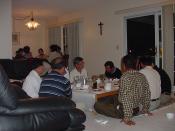With nowhere else to turn, many consult with their faith, in attempt to explain or seek answers to questions they may not be able to answer. Any establishment that -possesses a position of great power and influence over numerous individuals should adopt a universal policy dealing with modern day issues. The Roman Catholic Church is such an establishment. With its influence over more than a billion individuals worldwide, the Church is placed in a position of declaring a uniform, non-ambiguous policy relating to topics in question. A serious modern day topic that the Church must address is the global pandemic of AIDS. Organizations continue to honor their religious roots and still have a place for spirituality, but the original meaning of religion has changed. Spread by sexual contact and reusing needles during intravenous drug use, AIDS is an issue that must be addressed by major institutions.
Contemporary policy discourse is marked by increased interest in expanding the role of faith-based organizations in treating epidemics.
The idea is broadly supported and has begun to influence public and private policies. Sponsored conferences on the issue, and private foundations have expanded their commitment to supporting religious groups. The creation of the Office of Faith-Based and Community Initiatives was one of the first domestic policy efforts of the Bush administration. Its work institutionalizes efforts already under way: to increase charitable donations and volunteering, and to expand the role of faith-based organizations in human services by encouraging them to seek public funding (The Economist, 2001).
Expanding the role of faith-based organizations is also part of a broader pattern of restoring a sense of morality and civility to American life. The concept was first forwarded by conservatives and neoconservatives who suggested that it would decrease various social problems such as drug use, teenage pregnancy, and welfare dependency. As Marvin Olasky (1997, p. 73) notes, "The successful antipoverty pushes in American history have been religiously based. They have worked on the inside by changing hearts and not just temporarily changing habits." Supporters of the expanded role of faith-based organizations point out that religious organizations provide moral guidance, teach individual responsibility, and provide a framework for individual transformation that is absent in secularized human service programs. Faith-based organizations mobilize committed groups of volunteers who are motivated by religious precepts and the belief that they are doing God's work (Harris 1999). Some contemporary research and policy discourse is a rediscovery of the critical role of religious organizations in the awake of AIDS epidemics.
Recent studies in the sociology of religion point out that America has become a spiritual marketplace (Roof 1999). Growing numbers of Americans define their own sense of faith rather than conforming to a specific religious tradition. The impact of religious precepts is palpable but very subtle, a finding that is highly consistent with Alan Wolfe's (1998) observation that many Americans adhere to a "quiet faith" where religion is highly personal and privatized. The place of religion in American political culture is also highly paradoxical. Americans honor the separation of church and state, but in facing epidemics religious stereotypes have been reinterpreted as universalistic and ecumenical rather than particularistic.



